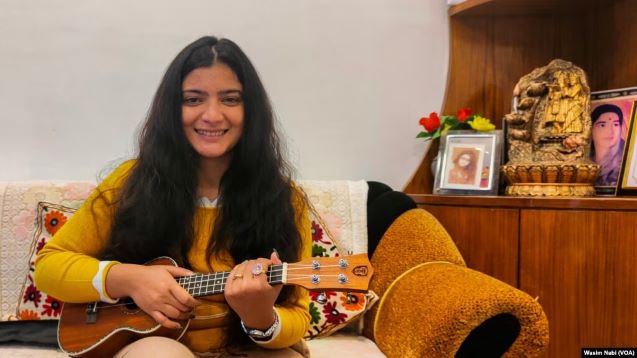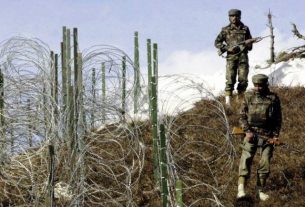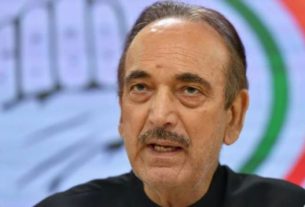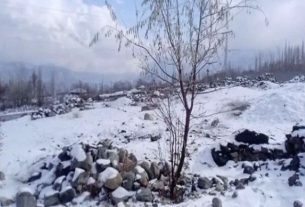SRINAGAR, INDIAN ADMINISTERED KASHMIR — When entrepreneur Sana Bhatt decided to set up a studio, she hardly knew if people would appreciate her efforts to revive traditional music on the Indian side of Kashmir.
Prior to the launch of the studio, the 24-year-old approached many local artists to sing songs on a set that that appeared similar to that of the Pakistan-based musical show, “Coke Studio.”
“Kehwa Beats” is the name of the show streamed live on Bhatt’s YouTube channel, Kashmir Originals. It went on to become a big hit with just six tracks. Eight artists, including two women, set the stage on fire, singing songs written by local poets from the disputed Himalayan territory.
“I felt there was a need to bring out domestically produced songs so that people can consume our music,” Bhatt told VOA.
“Kashmir has a rich culture and has an outstanding heritage of producing wonderful music,” she said, adding that music helps people living in different parts of the world understand different cultures.
The task of setting up an appealing studio, according to Bhatt, was challenging in the face of what she says is a social mindset that places restrictions on women.
“I had expected a good response but had no idea that people from outside Kashmir, too, would fall in love with our music,” Bhatt told VOA. “One of our female artists was trolled because of her clothing during her performance, otherwise everything went smoothly.”
Shift to local music
For more than two decades, residents of Kashmir used to listen to music sung by well-known artists from India and Pakistan. Musicians such as Aatif Aslam, Rahat Fateh Ali Khan, Bohemia, Honey Singh, Neha Kakkar and Shreya Ghoshal used to reverberate in every household.
However, artists such as Mohammad Muneem and Noor Mohammad Shah, and a duo of Irfan and Bilal brought the attention of the local population back to domestically produced songs.
The revival of traditional Kashmiri music remained confined to men for several years until female singers such as Aabha Hanjura, Memet Syed, Vibha Saraf and others released their own tracks.
“There are many people who say ‘Why (do) females produce or sing songs?’ but at the same time appreciate men for doing the same,” Bhatt said. “People often relate women’s singing to religion. I ask them if it is related to the religion then both men as well as women should be targeted as religious restrictions are meant for both the genders.”
Difficult success
Nargis Khatoon, a young Kashmir-born New Delhi-based singer, believes women musicians don’t find good opportunities in the valley, unlike in other parts of India. As a result, it becomes difficult for singers like her to thrive in Kashmir.
“I live in New Delhi and find number of opportunities here, but if we speak about Kashmir we don’t have [a] commercial market to perform due to a large number of youth [who] hesitate in choosing music as a career,” Khatoon said.
Khatoon sees hope in people such as Bhatt coming forward and setting up a platform that allows musicians to present their talent in front of the world without any gender bias. But she said some broad-minded parents allow their daughters to choose their career in music only to have fears of an unstable future sometimes cause them to change their minds.
“I believe this is one of the reasons parents don’t allow girls to become singers, as they are worried about their future,” said Khatoon. “If more opportunities are provided in Kashmir, we might witness more and more female artists coming forward and joining the industry.”
‘More artists are welcome’
The Kashmir valley historically has produced many female singers who created a lasting impact on people of the region with their unique vocalization.
Years ago, the local population would be glued in front of radio and televisions for hours so that they could listen to their favorite female artists — household names such as Raj Begum, Naseema Akhther and Shameem Dev Azad.
Ishfaq Kawa, one of the popular singers in the valley, said that like men, women should work to promote traditional music because of their love for the Kashmiri language and culture.
“They [women] too love and do their bit to protect and promote our cultural music,” Kawa told VOA. “More and more artists are welcome to join this field, and everyone should respect them.”
However, Kawa disagrees with a popular notion that women singers are the only victims of abuse on social media.
“The thing is, an individual has to carry on without caring and thinking about such people,” said Kawa. “If we pay heed to what people say then we have to stop doing what we believe is good for our mother tongue.”
The show must go on
Bhatt, the entrepreneur, meanwhile is working on Season 2 of her show. Many popular as well as new faces will join Kashmir’s own “Coke Studio.”
“I and my team this year will focus folk songs of Kashmir,” Bhatt said. “Season 1 of ‘Kehwa Beats’ was the fusion of folk and hip-hop. In Season 2 we will try to give our folk music a contemporary touch which I believe would be popular among the masses, especially youth.”
Kashmir Originals, she said, not only provides a platform for singers but also for the instrumentalists, who she says add beauty to music.
“Both men and women instrumentalists are part of Kashmir Originals and ‘Kehwa Beats,'” Bhatt said. “Instrumentalists are as important as singers because they put life in the songs.”__Courtesy VOA News





